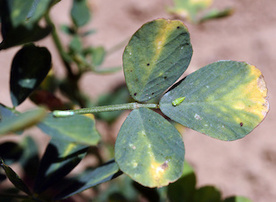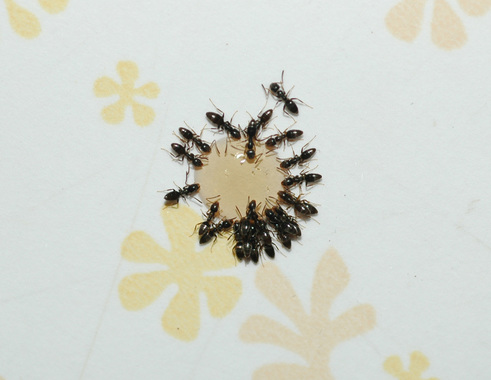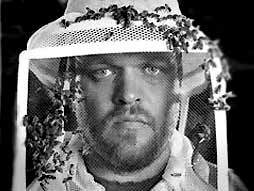Research Professor at the University of Maryland's Department of Entomology, Barbara Thorne, works with Florida Department of Agriculture and Consumer Services to prevent large termite nests from spreading in Florida.
Mike Raupp discusses the most common invader of households in the spring, odorous house ants! While some people find the idea of ants in their kitchen repulsive, Raupp says they’re more of a nuisance than anything else. They don’t bite, sting or spread diseases.
“Ants are clean. Ants are not important distributors of microbes or disease-causing agents,” Raupp says. Read more about this article at WTOP! Not as many people are aware of the crucial role that honeybees play in maintaining agriculture. But Dennis vanEngelsdorp, professor of entomology at the University of Maryland and director of its Honey Bee Lab, is doing what he can to highlight their relationship to crop production — and why their large, global die-off in the past few years is such a major concern.
University of Maryland entomologist Dennis vanEngelsdorp explains to Cantor, and us, how he and others in the field are trying to keep colonies — and ultimately our kitchens — stocked. Click to Watch The VideoEntomologist Michael Raupp has fed Jay Leno a cicada. He’s consulted the TV series “Bones” on bugs found on cadavers in the Washington, D.C., area. He’s practically a regular on NPR and WTOP. Click on link to learn more.
http://terp.umd.edu/bug-man-on-campus/ Dennis vanEngelsdorp in the New York Times: The Head-Scratching Case of the Vanishing Bees
Click on the link for video and full story. http://www.nytimes.com/2014/09/29/us/the-head-scratching-case-of-the-vanishing-bees.html?rref=us&module=Ribbon&version=context®ion=Header&action=click&contentCollection=U.S.&pg Professor Bretton Kent featured in video 'Shark Finder' Brings Science Excitement to Classrooms8/8/2014
You can view the video on any of the links below. On VOA Voice of America Homepage as Featured Video http://www.voanews.com/ Under Science and Technology on VOA homepage http://www.voanews.com/content/sharkfinder-brings-excitement-to-classrooms/1973289.html Listen to an NPR story titled "Hunting for Alien Bug And Seed Invaders At Baltimore's Port" which includes an interview with Mike Raupp at this link: http://www.npr.org/blogs/thesalt/2014/06/16/319499925/hunting-for-alien-bug-and-seed-invaders-at-baltimores-port
Bretton Kent and Kid Scientists Make Real Fossil Finds at the USA Science & Engineering Festival6/13/2014
Brett Kent's work with kids & fossils highlighted in Scientfic American editor-in-chief's story on CMNS homepage:
Shark Hunters: Bretton Kent's Lab Helps "Kid Scientists Make Real Foossil Finds" -Scientific American and story in the Washington Post: http://www.washingtonpost.com/lifestyle/home/loudoun-country-day-school-students-get-hands-on-experience-in-hunting-for-fossils/2014/06/10/c14d8e44-efe9-11e3-914c-1fbd0614e2d4_story.html A breakthrough in the efforts to genetically modify honey bees was recently reported by Christina Schulte and colleagues from Heinrich Heine University in the Proceedings of the National Academy of Sciences of the United States of America.
Click link for full article. http://home.ezezine.com/1636/1636-2014.06.12.07.55.archive.html David O’Brochta is the director of the Insect Genetic Technology Research Coordination Network (IGTRCN) and is a professor in the Department of Entomology and the Institute for Bioscience and Biotechnology Research at the University of Maryland, College Park. He has an active research laboratory focused on insect genetics and molecular genetics with interests in the development of insect genetic technologies and their application to the study of the physiological genetics of mosquitoes, with particular interest in their disease-vector capabilities. Professor O’Brochta teaches at the undergraduate and graduate levels, is the Head of the Institute for Bioscience and Biotechnology Research’s Insect Transformation Facility, and he is the editor of the Royal Entomological Society’s journal Insect Molecular Biology. Congratulations to Dennis VanEngelsdorp for being quoted with good news in the New York Times!
Click link for full story. http://www.nytimes.com/2014/05/16/us/honeybees-report.html?ref=science&_r=0 |
Categories
All
Archives
June 2024
|
Department of Entomology
University of Maryland
4112 Plant Sciences Building
College Park, MD 20742-4454
USA
Telephone: 301.405.3911
Fax: 301.314.9290
University of Maryland
4112 Plant Sciences Building
College Park, MD 20742-4454
USA
Telephone: 301.405.3911
Fax: 301.314.9290




 RSS Feed
RSS Feed




